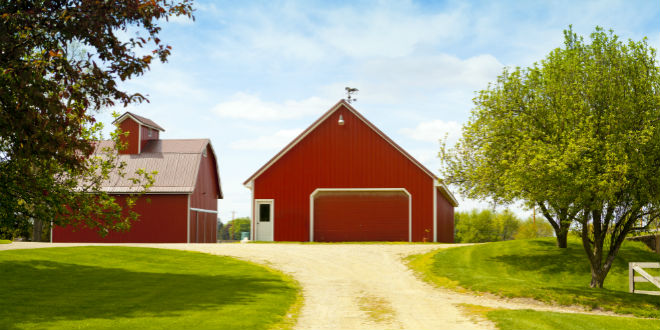May 16, 2016Prevention is key against insurance claims
Precaution and prevention are key factors in making sure your farm is properly insured and protected against claims. Mark Epple, a Michigan Farm Bureau Insurance agent, discussed prevention and insurance coverage at the recent Midwest Agritourism Expo in Lawrence, Michigan.
The owner of an apple and grape farm, Epple said he understands his clients, most of whom work in agriculture or agritourism.

“They’re pretty ingenious. They’re at the front line giving the consumer exactly what they want,” Epple said. “They sense what the customer wants, they listen to them and they adapt their operation to meet it.”
“As our ag entertainment owners listen to what the customers want and as they change their operation to give customers what they want, it gives us some unique things to look for in insurance to make sure they’re properly protected,” Epple said.
With additions like zip lines, corn mazes, bounce houses and haunted barns becoming more common, Epple said policies have had to be re-examined.
“Fifteen years ago, if you would’ve said we’re going to have zip lines on farms people would’ve said ‘you’re crazy,’ but now you see zip lines on farms,” he said.
Epple has also noticed a trend in farms, including those not already involved in agritourism, hosting events such as weddings, reunions and corporate outings.
“We get a tremendous amount of calls every year in regard to wedding receptions on farms. Nowadays that’s kind of the trend, people want to have that special event out on the farms,” Epple said. “We’ve had to change some of the endorsements we can add to a farm owner’s policy to make sure we can provide coverage for those special circumstances,” Epple said.
Wedding receptions in particular seem to be a trend that more agritourism and non-agritourism farms may get involved in because of the money that can be made. A farmer cleared a path on his farm and made $10,000 on hosting a wedding reception there, Epple said of one of his clients.
Higher-risk attractions, such as zip lines could be covered but would be analyzed on a case-by-case basis, Epple said.
“We are warming up to zip lines,” he said. “Fair rides, tilt-o-whirls, carnival rides, we’re still not ready for that yet. We’d have to look through a surplus line carrier (for coverage).”
When looking at lawsuits against farms, Epple said the most important question is: Did you do something to prevent this? Caution and prevention are key when trying to keep visitors and staff safe.
“The phrase ‘What’s your policy?’ is never going to go away,” Epple said.
Epple recommends farm owners have standard operating procedures in place, with clear policies, procedures and expectations. Sharing those procedures with agritourists by posting them around your farm and online can help establish expectations. For example, Epple said u-pick or u-cut Christmas tree operations should have clear instructions posted on how to properly use all equipment.
“Keep in mind that the people coming on your farm are going there for the experience, but they’re removed from agriculture,” Epple said.
Setting expectations of what visitors will experience on the farm can help them be more aware of their surroundings. Adding disclaimers that visitors are on an active working farm can be helpful as well, Epple said. For example, let visitors know tractors and large trucks are around, or if you have live animals, you can make note of manure or other situations that may arise. Owners must set expectations based on what their business is.
“It might rain, it might be dirty, it might be dusty,” Epple said. “What’s your policy on eating what you pick on the farm? It needs to be washed … We have to find a way to communicate that to people that are using our facility, and sometimes it’s the simplest things that are missed.”
Creating partnerships and inviting other businesses onto your farm can be great for both businesses, but it’s important to make sure all parties involved are properly insured, Epple said. Asking a vendor for a certificate of insurance liability isn’t out of the norm, and is good business practice, he said.
While some agritourism farms have upgraded registers to accept debit and credit cards, many farms may still have larger quantities of cash on the property.
“My advice: buy a safe – a big safe,” Epple said. “I’ve had numerous claims from cash stolen that have been denied or paid a max of $1,000 because it hasn’t been in a locked spot and forcible entry has not been shown.”
Additional coverage farm owners should consider, according to Epple, is product recall insurance and pollution liability coverage. Michigan Farm Bureau’s base policy currently allows for $10,000 to recall products from market; the maximum allowed is $100,000 Epple said. For pollution liability coverage, a base policy covers $25,000. Examples of claims are diesel tank leaks or overspray. Epple suggests farmers regularly monitor diesel tanks and keep containment pads on hand in case of leaks.
“In my opinion (pollution liability) is one of the most easily overlooked spots in your farm policy,” he said.
Annual reviews of current policies with an insurance agent can help farmers ensure they have the proper coverage. Any fixes or upgrades made to a farm should always be documented, as they can be proof that you tried to do something to prevent accidents or injuries, according to Epple. Regularly analyze the farm yourself, or have an agent or someone else walk through your farm and look for conditions that may pose a risk.
“What somebody else sees on our farm, that’s where we’re going to get that corrective action,” Epple said.
— Ana Olvera, digital content editor















